This is a simple approach to making homemade vegan mayo with only five ingredients. Cashews are the main ingredient in the recipe. This vegan mayo is oil free and ready in minutes. Use it on all of your favorite plant-based sandwiches!
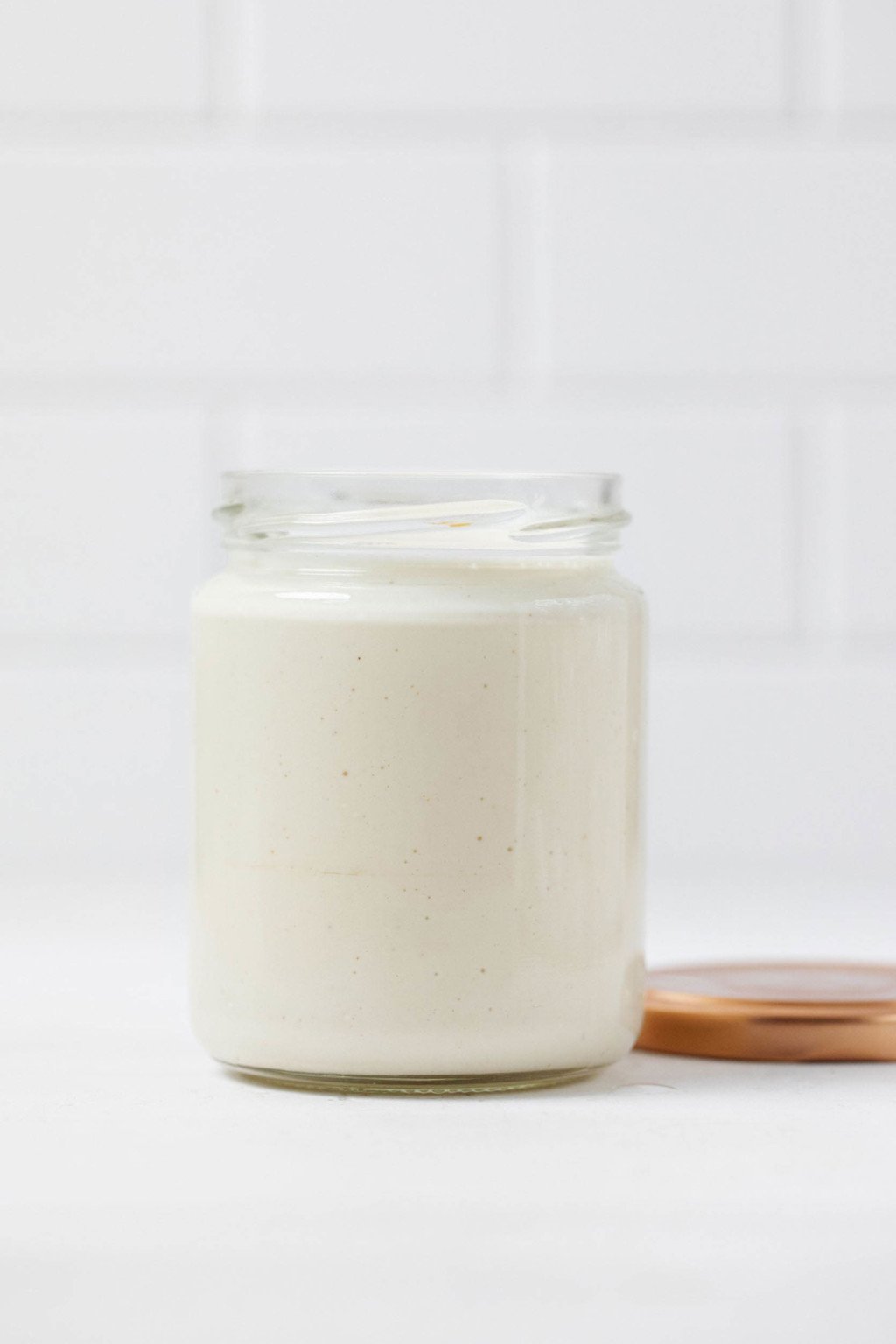
I’ve always been very happy to purchase vegan mayo. In fact, Vegenaise is one of the first plant-based condiments that I bought regularly.
In spite of the fact that I like to make many homemade staples, mayo has never been a priority.
Until this summer, that is.
Summer 2022 has been my summer of sandwiches. With the upheaval of moving, unpacking, and especially long work days, sandwiches have been the easiest lunch for me to throw together.
At a certain point, after my tenth or so consecutive Tofurky sandwich, I started to wonder about homemade vegan mayo.
I’ve attempted a vegan mayo once before, with aquafaba. I liked it. This time, however, I wanted to try a version with cashews.
My kitchen VIP
There’s probably no single ingredient that contributes more to the success of my vegan cooking than cashew nuts.
My love affair with cashews began when I was a new vegan. At the time, there was no cheese equivalent of Vegenaise—that is, a store-bought version of a traditional dairy food that I liked as much as the real thing.
I taste tested the commercial cheeses that were available then, and none seemed especially worthwhile. I decided to try making a soft vegan cheese at home.
That became my go-to cashew cheese, a simple recipe that I’ve relied on for more than a decade.
I’ve branched out beyond this cashew cheese since then. I now use cashews to make melty vegan cashew mozzarella, cashew queso, yellow cheese sauce (so good on a baked spud), cashew parmesan cheese, 4-ingredient vegan sour cream, and an easy, 10-minute vegan ricotta.
The creamy texture of cashews, combined with their mild flavor, makes them a perfect base for dairy substitutes.
When I’m not turning cashews into homemade vegan cheese, I use them for creamy sauces and dressings. Here too, their creamy texture comes in handy.
Some of my favorite cashew-based dressings include carrot cashew dressing, creamy cashew Dijon dressing, and cashew cilantro sauce.
And how could I forget about cashew cream? There is always at least one jar of cashew cream in my freezer or fridge, waiting for use in creamy pasta dishes, muesli, desserts, and more.
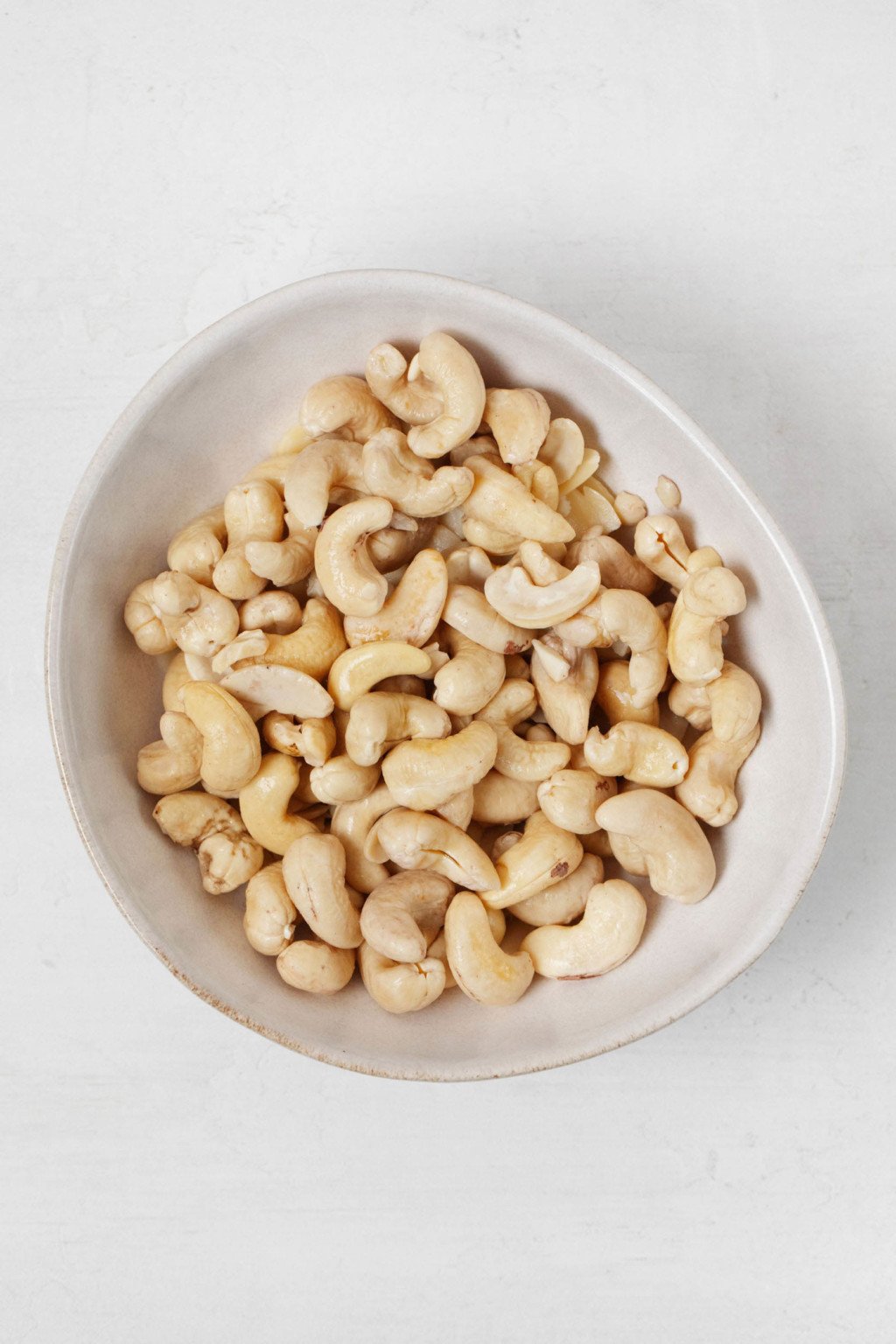
Health benefits of cashews
Nut consumption for heart health
As a registered dietitian, I spend a lot of time encouraging my clients to include nuts and seeds in their diets. The main reason I give this nudge is that a substantial body of evidence links nuts with heart health.
One longitudinal study with over 210,000 subjects compared consumption of a 1oz serving of nuts five or more times weekly with minimal nut intake.
Consumption of peanuts and tree nuts 2 or more times per week and walnuts 1 or more times per week was associated with a 13% to 19% lower risk of total cardiovascular disease and 15% to 23% lower risk of coronary heart disease during the study period, which was 32 years in total.
A 2019 meta-analysis (in other words, a study of other studies!) of 19 studies that examined nut consumption and cardiac health concluded that nuts had a beneficial role in reducing the incidence of, and mortality from, different cardiovascular disease outcomes.
Cashew nutrition
Each variety of nut has its own nutrition benefits to offer. Cashews are rich in magnesium, zinc, Vitamin K, and Vitamin B6.
In addition, the fats in cashews are of the heart-healthy, mono- and polyunsaturated variety. And those healthful fats make cashews satiating.
The versatility of nuts in plant-based recipes
Honest confession? I’m not a big nut eater. In other words, I don’t often grab and eat them by the handful.
I think that nuts are a great snack from a nutrition perspective. But I don’t love them on their own from a flavor texture perspective—and I love to love my food.
What I do love are things made with nuts. And fortunately, nuts are a versatile ingredient. They can be ground up, blended, chopped, sliced, and slivered.
They can then find their way into so many types of recipes: energy balls and snack bars, dressings and sauces, dips, vegan cheeses, baked oats, muffins, and desserts.
So, with the exception of an odd trail mix craving here or there, I usually cover my nut intake by enjoying them in recipes.
This homemade vegan mayo will become a new standby.
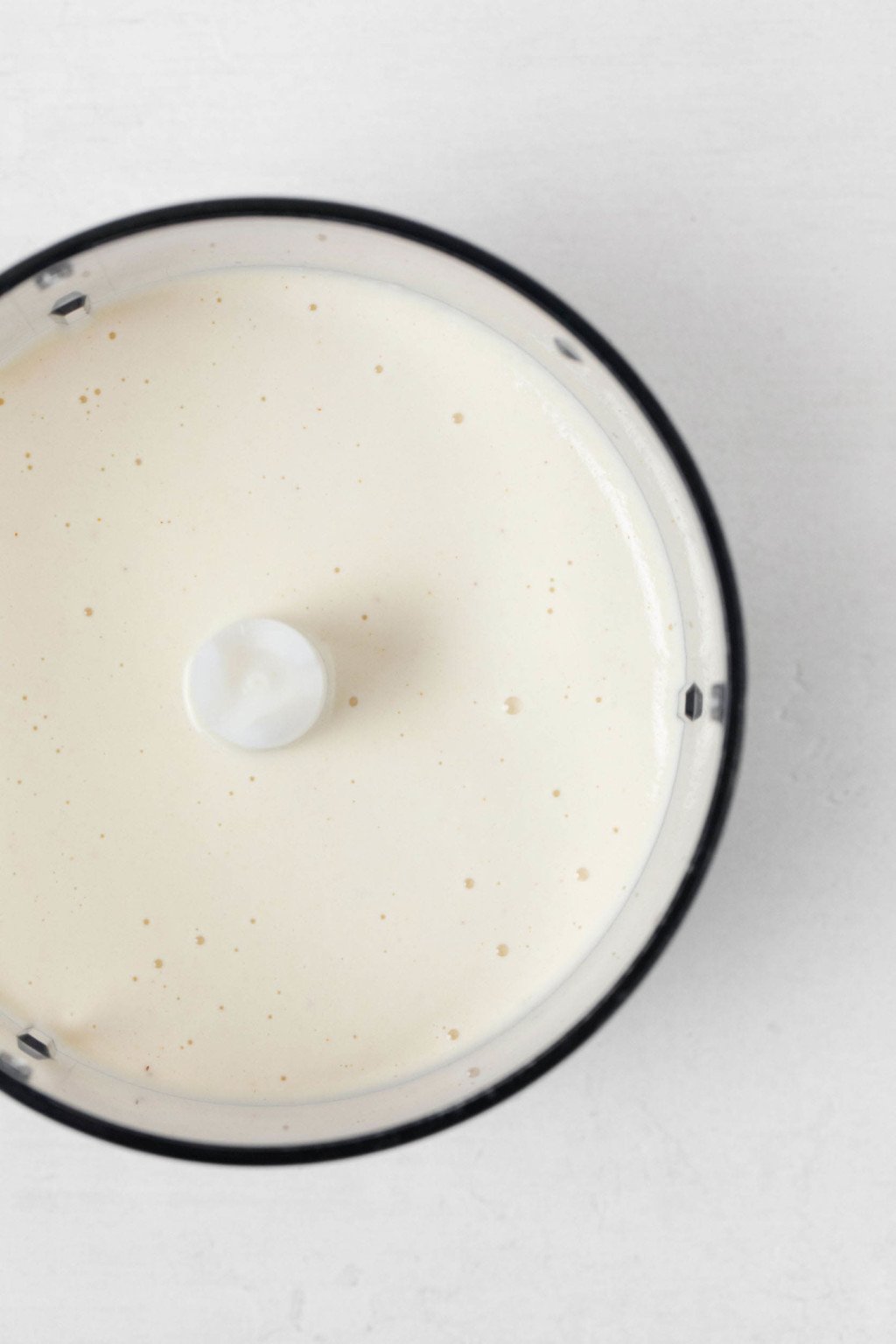
Making vegan cashew mayo
Normally for a recipe “how-to,” I’d offer a step-by-step. For this vegan mayo, it’s pretty simple!
Step one: soak
Cashews blend up most easily when they’ve been soaked in water. You can soak them in room temperature water for a minimum of two hours, or up to overnight.
If you soak the cashews for more than two hours, transfer them to the fridge while they soak.
You can also soak cashews in hot water for 30 minutes if you’re in a rush and forgot to start soaking them earlier.
Either way, be sure to drain the cashews of soak water before you use them in this recipe, or any other.
Step two: blend!
Yep—that’s it. The only remaining thing to do with the cashews after you soak them is to blend them up with lemon juice and white wine vinegar, salt, Dijon mustard, and water.
You can use either a food processor or a high-speed blender for the blending. If you use a food processor, be sure to stop the machine a few times, scrape down the bowl, re-cover, and then continue processing. This will ensure a smooth mayo.
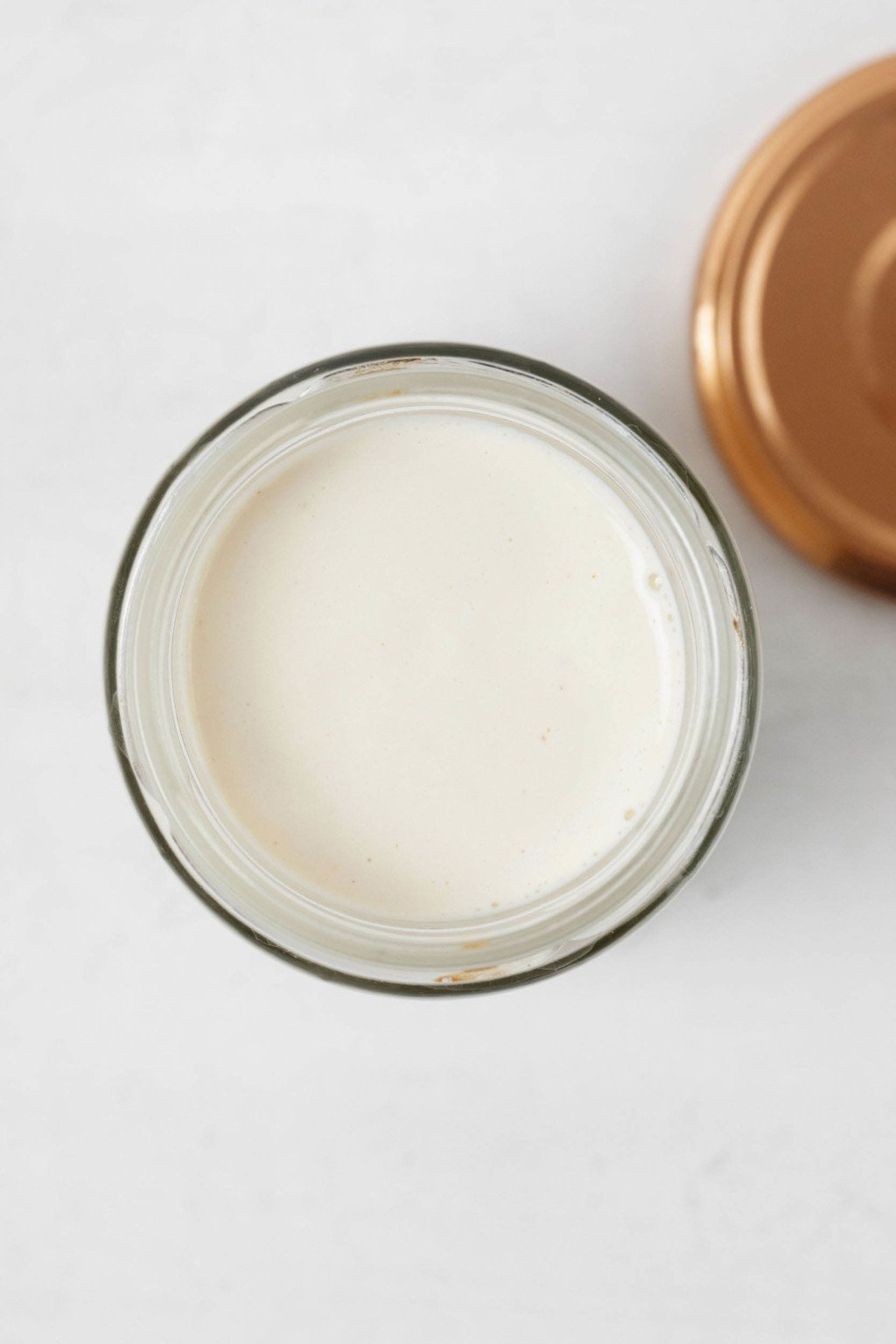
Tips for texture
Whether you use a processor or a blender, I recommend starting with 5 tablespoons of water and increasing by 3 more, to 8 tablespoons total, if you need to.
The amount of water needed will depend on how much water your cashews absorbed during soaking, and that depends on their age and texture.
When the mayo is first blended, it will be a bit “looser” than traditional mayo is. It will thicken up in the fridge, though, as you store it.
What type of cashews should I use?
I recommend using cashews that are labeled as “raw” or “unroasted” and unsalted. Roasted, salted cashews have too strong a flavor to work for the mayonnaise recipe.
Can I substitute the cashews?
If you have a cashew allergy, then macadamia nuts or pine nuts will be the best substitute in this recipe.
I know that neither of these substitutes is inexpensive, unfortunately, but they will each do the best job of creating the same texture, flavor, and results as the cashew nuts do.
If you have an allergy to all tree nuts, then aquafaba mayo is a fun alternative to explore.
Meal prep and storage
The cashew mayo would be a great homemade staple to add to your meal prep routine. It will keep for 4-5 days in an airtight container in the fridge.
Can I freeze vegan mayonnaise?
Yes, you can! The vegan mayo, just like cashew cream, can easily be frozen.
Transfer it into storage containers, leave a little head space at the top of the container (liquids expand as they freeze), and freeze the mayo for up to six weeks.
What to do with vegan mayo
Once the vegan mayo is ready, you can use it in any recipe that regularly calls for mayonnaise.
Here are some of the recipes that I plan to try using it in:
This week, I’ve been doing a lot of tomato cheese sandwiches: a couple slices of vegan cheese, slices of perfect summer tomatoes, lettuce, the homemade vegan mayo, and some Dijon mustard.
It’s especially good on my classic white sandwich bread.
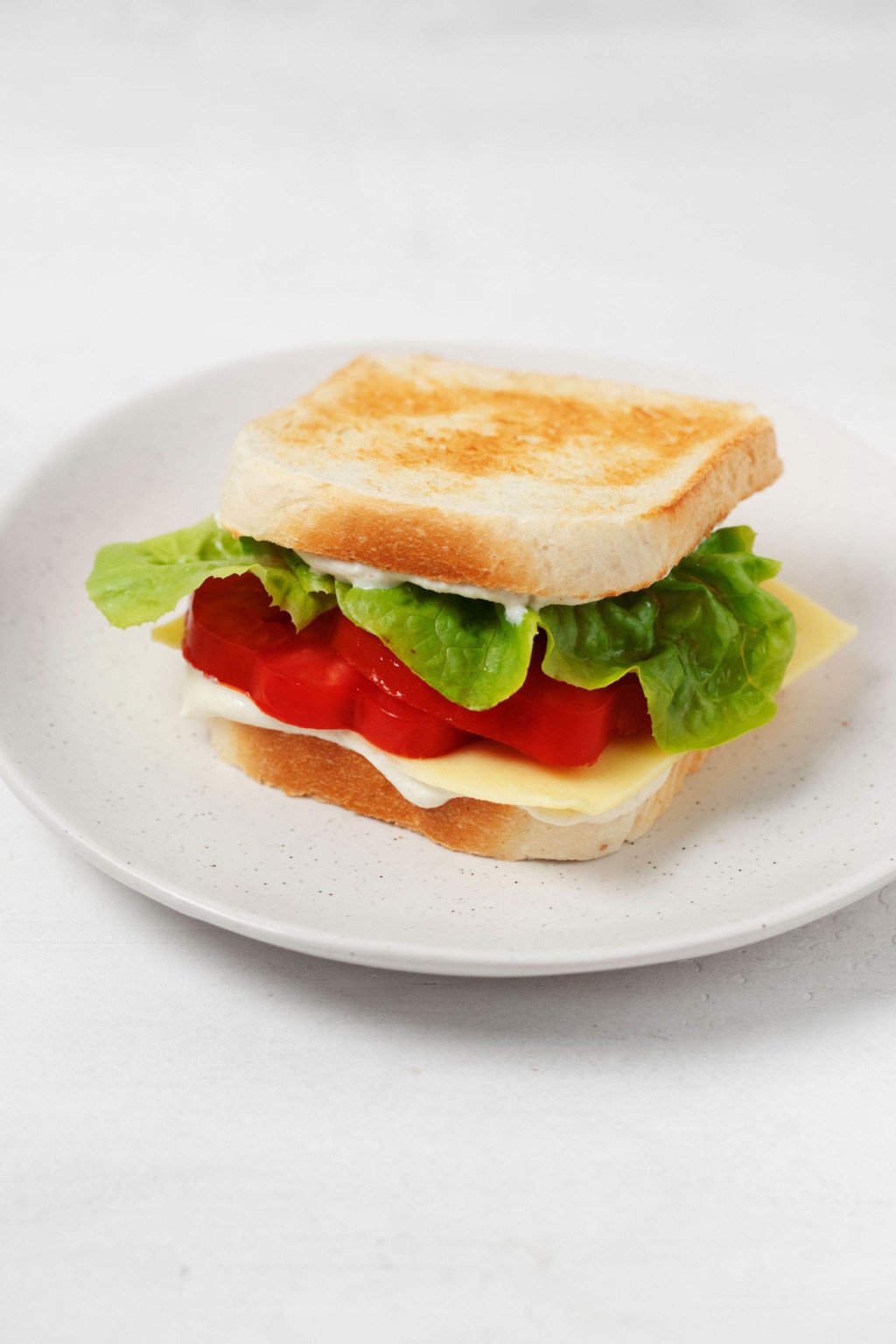
No matter what you do with it, I hope you’ll come to love this simple—and relatively nutritious—homemade mayo.
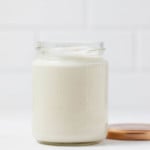
Vegan Mayo with Cashews
Author –Ingredients
- 1 cup raw cashews, soaked for at least 2 hours and drained (140g)
- 3/4 teaspoon fine sea salt
- 1/2 teaspoon Dijon mustard
- 2 teaspoons white wine vinegar (substitute apple cider vinegar)
- 1 teaspoon freshly squeezed lemon juice
- 5-8 tablespoons water
Instructions
- Start with five tablespoons of water. Blend all ingredients in a high speed blender or process in a food processor, stopping periodically to scrape the sides down, until the vegan mayo is creamy and completely smooth. Add up to three more tablespoons of water as needed, to facilitate blending without sacrificing a rich, spreadable texture. Store the vegan mayo in an airtight container in the fridge for 4-5 days.
Speaking of long, busy days, this week has flown by already! I’ll be back soon, for the weekend check-in.
xo
This post may contain affiliate links. If you use these links to buy something I may earn a commission. Visit my privacy policy to learn more.
Method: Blender
Ingredients: Cashew Nuts
Dietary Preferences: Gluten Free, No Oil, Soy Free, Vegan
Recipe Features: 30 Minute or Less, Quick & Easy

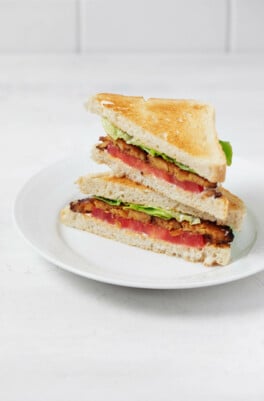
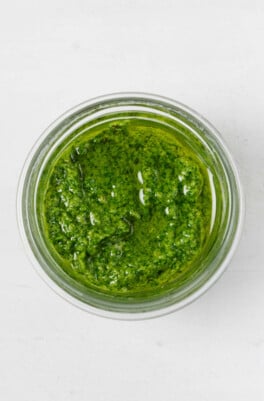
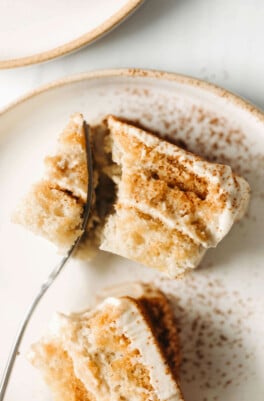
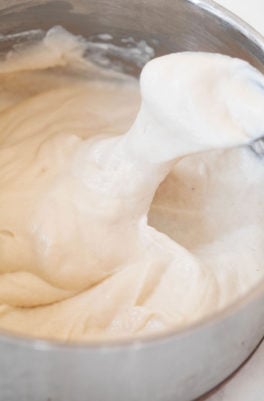

Leave a Comment
Hi Gina,
So you think this would freeze well? I prefer the idea of this type of mayo than one that relies on vegetable oil, but the reason why I always end up with a jar of Follow Your Heart instead is convenience of having it on hand and not having it spoil if it’s not all used up in a few days.
Thanks for all your posts.
Hi Maria,
Yes, you can absolutely freeze it! If you do, you may want to decrease the water in the recipe very slightly, maybe one or two fewer tablespoons. Its consistency becomes slightly more liquidy when it is defrosted. You can freeze it for up to 8 weeks.
Hope this helps 🙂
G
I appreciate the prompt reply, Gena -I’m off to soak cashews! (And pretty much make everything else in your latest smoky tofu sandwich blog post… if I’m being honest )
Well, I’m glad that the post sparked some inspiration! 🙂
Really hope you enjoy.